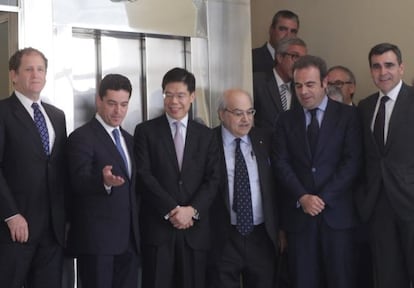Funding for BCN World resort would be pulled if Catalonia leaves EU
“Uncertainty adds difficulty,” explains president of macro-casino project


The continued interest of Asian investors in Barcelona’s planned BCN World macro tourism resort is in no way dependent on Catalonia remaining within the Spanish state. But there is a line in the sand, it would appear, and it is the one that borders the rest of Europe.
The president of the project, Xavier Adserà, explained during a presentation at the Esade business school on Wednesday that “uncertainty adds difficulty to any project,” and that membership of the European Union is essential for “questions of financial and legal security.”
BCN World was unveiled last year by savings bank La Caixa, businessman Enrique Bañuelos and the Catalonia regional government, in the wake of the announcement by casino tycoon Sheldon Adelson that his Eurovegas project would be going to Madrid. The planned resort will cover 900 hectares of land and create 17,000 direct and indirect jobs on the back of a 900-million-euro investment. The complex will feature leisure installations, stores, casinos and other businesses.
Everything is in place and we hope to finish before Eurovegas”
The region of Catalonia, however, is currently mired in a battle with Spain’s central administration over independence. The nationalist government of CiU premier Artur Mas is pushing for a vote in the region about a possible breakaway from Spain, something that the center-right national government of the Popular Party is dead against. What’s more, this week, the European Commission vice president responsible for competition, Spaniard Joaquín Almunia, said that if Catalonia opted to break away from Spain and create a new state, it would automatically cease to belong to the European Union.
Assuming that doesn’t happen, Adserà explained that the financing for the BCN World project would be secure. “There is ready money for investments in gaming and tourism developments.” And that money is predominantly Asian.
On the subject of Eurovegas, a massive casino and leisure complex planned in the Madrid suburb of Alcorcón, Adserà erred on the side of positivity. Adelson’s brainchild will be competition for BCN World, he said, but “while in some aspects we will compete, in others we will help each other. Spain is a popular destination, the two projects will be two hours away by rail and that is no problem for tourists from China. Tourism needs scale and Eurovegas makes us bigger.”
Competition for suppliers will be fierce though: “We have all the infrastructure in place and we hope to finish before [Eurovegas].”
Adserà said he hoped the regional government’s draft law improving fiscal conditions for casinos would be approved in October, the licenses issued shortly afterward, and construction work started “during the first quarter of 2014,” with a view to a 2016 inauguration.
The project chief also said that the national smoking ban — which Adelson is attempting to have relaxed at Eurovegas — would pose no problems. “People know from the outset that in Europe you can’t smoke,” he said.
Adserà added that BCN World would “fill a void; the lack of a large integrated resort in Europe. There are no big casinos or centers where conventions can be organized with enough beds to house thousands of people. BCN World is about creating a destination that does not exist in Europe.”
Veremonte, Bañuelos’ investment company, has not ruled out floating BCN World when the project is up and running. In the view of the company, there are a projected “100 million rich Chinese” who will travel abroad in 2020. “They do not want to go to the beach or play golf. For them, leisure is gambling, culture and shopping,” said Adserà.
BCN World already has agreements in place with the Melià hotel chain to run the hostelry aspect of the complex, with Value to manage the luxury shops and Melco, which runs a casino in Macau, to take care of the gaming.
Tu suscripción se está usando en otro dispositivo
¿Quieres añadir otro usuario a tu suscripción?
Si continúas leyendo en este dispositivo, no se podrá leer en el otro.
FlechaTu suscripción se está usando en otro dispositivo y solo puedes acceder a EL PAÍS desde un dispositivo a la vez.
Si quieres compartir tu cuenta, cambia tu suscripción a la modalidad Premium, así podrás añadir otro usuario. Cada uno accederá con su propia cuenta de email, lo que os permitirá personalizar vuestra experiencia en EL PAÍS.
¿Tienes una suscripción de empresa? Accede aquí para contratar más cuentas.
En el caso de no saber quién está usando tu cuenta, te recomendamos cambiar tu contraseña aquí.
Si decides continuar compartiendo tu cuenta, este mensaje se mostrará en tu dispositivo y en el de la otra persona que está usando tu cuenta de forma indefinida, afectando a tu experiencia de lectura. Puedes consultar aquí los términos y condiciones de la suscripción digital.








































